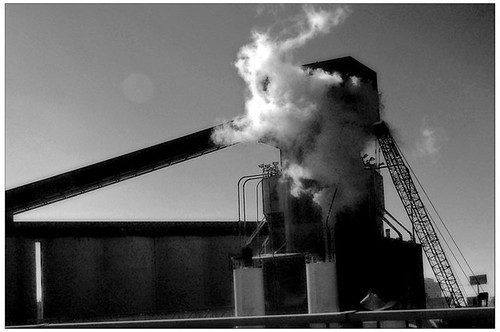Good - the less coal that is burned the better! Does this mean we as a nation have solved our energy problems? No, but eliminating coal as an option will be good for us in the long run, despite what coal industry shills claim. I would suggest that research into alternative sources of energy is stimulated when options like “more coal plants” are removed.
Coal's Doubters Block New Wave Of Power Plants - WSJ.com:
From coast to coast, plans for a new generation of coal-fired power plants are falling by the wayside as states conclude that conventional coal plants are too dirty to build and the cost of cleaner plants is too high.
If significant numbers of new coal plants don't get built in the U.S. in coming years, it will put pressure on officials to clear the path for other power sources, including nuclear power, or trim the nation's electricity demand, which is expected to grow 1.8% this year. In a time of rising energy costs, officials also worry about the long-term consequences of their decisions, including higher prices or the potential for shortages.
...But as plans for this fleet of new coal-powered plants move forward, an increasing number are being canceled or development slowed. Coal plants have come under fire because coal is a big source of carbon dioxide, the main gas blamed for global warming, in a time when climate change has become a hot-button political issue.
Technorati Tags: Energy, environment, pollution
The rapid shift away from coal shows how quickly and powerfully environmental concerns, and the costs associated with eradicating them, have changed matters for the power industry. One place where sentiment has swung sharply against coal is Florida. Climate change is getting more attention there because the mean elevation is only 100 feet above sea level, so melting ice caps would eat away at both its Atlantic and Gulf of Mexico coasts.In mid-July, Florida Gov. Charlie Crist convened a climate-change summit to explore ways the state could improve its environmental profile. In June, he signed into law a bill that authorizes the Florida Public Service Commission to give priority to renewable energy and conservation programs before approving construction of conventional coal-fired power plants.
The law was bolstered by a recent report from the nonprofit American Council for an Energy Efficient Economy that found Florida could reduce its need for electricity from conventional sources, like gas and coal, by 29% within 15 years if it implemented aggressive energy efficiency measures.
On the eve of the governor's summit, backers of a major power-plant proposal said they would suspend development activities for an 800-megawatt coal-fired plant proposed by four city-owned utilities including the one serving the state capital, Tallahassee. (One megawatt can power 500 to 1,000 homes.) The backers cited environmental issues.
That decision followed the rejection by the utility commission of a proposal by Florida Power & Light Co., a unit of FPL Group Inc., to build a 1,960-megawatt coal plant in Glades County, Fla. The commission found that the plant was cost effective in fewer than half the scenarios examined. One reason for its poor showing is uncertainty about the future cost to curb carbon dioxide pollution. Coal plants emit more than twice as much carbon dioxide per unit of electricity produced as natural-gas-fired plants, but there's no cheap, easy way to capture and dispose of the greenhouse gas.
Even proposals to build so-called “clean coal” plants have been met with skepticism. This new technology, which primarily involves converting coal into a combustible gas for electricity generation, has been touted as a solution to coal's global-warming problems.
A hearing judge at the Minnesota Public Utilities Commission is urging commissioners to reject a plan for Northern States Power Co., a unit of Xcel Energy Inc., Minneapolis, to buy about 8% of its electricity from a coal-gasification power plant that was proposed by Excelsior Energy Inc., Minnetonka, Minn. The judge concluded the 600-megawatt Excelsior plant wouldn't be a good deal for consumers.
The judge concluded it would cost an extra $472.3 million, in 2011 dollars, to make the power plant capable of capturing about 30% of its carbon dioxide emissions, and another $635.4 million to build a pipeline to move the greenhouse gas to the nearest deep geologic storage in Alberta, Canada. Thus, $1.1 billion in pollution controls had the potential to inflate the cost of power coming from the plant by $50 a megawatt hour, making electricity from Excelsior twice as costly as power from many older coal-fired plants that simply vent their carbon dioxide. The recommendation will be considered by the commission on Aug. 2.


You might find this an interesting inside look at another option: http://RadDecision.blogspot.com